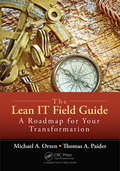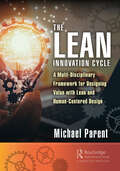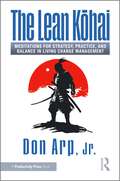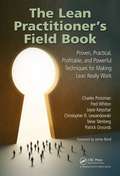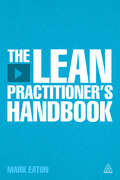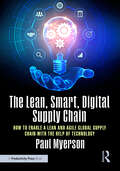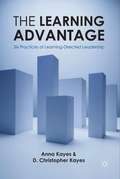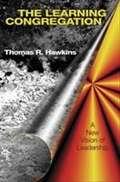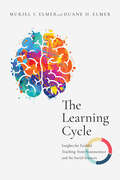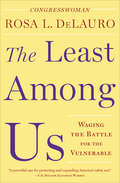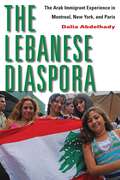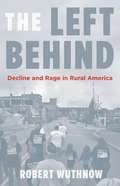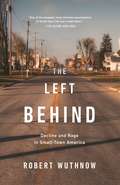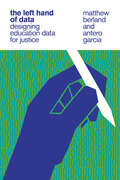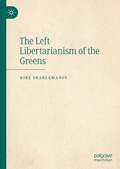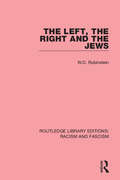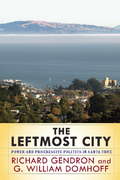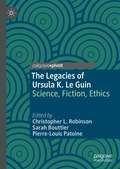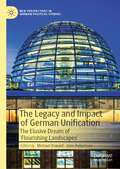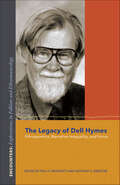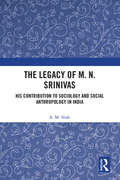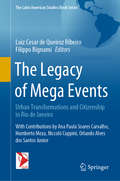- Table View
- List View
The Lean IT Field Guide: A Roadmap for Your Transformation
by Michael A. Orzen Thomas A. PaiderHow many IT books have you read that are long on theory and short on practical application? They are interesting, but not very impactful. They provide a framework from which to think and understand, but lack a process from which to act. Addressing this urgent need for the IT community, The Lean IT Field Guide explains how to initiate, execute, and sustain a lean IT transformation.Illuminating a clear path to lean IT, the authors integrate more than two decades of combined experience to provide you with a proven method for creating and sustaining a true lean IT workplace. This field guide not only highlights the organizational techniques of more agile and lean processes, but also the leadership work required to help management adopt these new approaches.Based on proven methods from different industries, including banking, manufacturing, insurance, food and beverage, and logistics, the book details a clear model that covers all the components you need to achieve and sustain a favorable work environment and culture in support of lean IT.Filled with anecdotes and case studies from actual businesses, the book includes pictures, templates, and examples that illustrate the application of the lean methods discussed.
The Lean IT Field Guide: A Roadmap for Your Transformation
by Michael A. Orzen Thomas A. PaiderHow many IT books have you read that are long on theory and short on practical application? They are interesting, but not very impactful. They provide a framework from which to think and understand, but lack a process from which to act. Addressing this urgent need for the IT community, The Lean IT Field Guide explains how to initiate, execute, and sustain a lean IT transformation.Illuminating a clear path to lean IT, the authors integrate more than two decades of combined experience to provide you with a proven method for creating and sustaining a true lean IT workplace. This field guide not only highlights the organizational techniques of more agile and lean processes, but also the leadership work required to help management adopt these new approaches.Based on proven methods from different industries, including banking, manufacturing, insurance, food and beverage, and logistics, the book details a clear model that covers all the components you need to achieve and sustain a favorable work environment and culture in support of lean IT.Filled with anecdotes and case studies from actual businesses, the book includes pictures, templates, and examples that illustrate the application of the lean methods discussed.
The Lean Innovation Cycle: A Multi-Disciplinary Framework for Designing Value with Lean and Human-Centered Design
by Michael ParentCurrently, businesses are forced to be more innovative than ever before. Organizations must be sensitive to global trends such as digitization, globalization, and automation and at the same time, build resilience and flexibility to combat unexpected changes in customer demand. The recent coronavirus pandemic is just the most recent and pronounced example of this new-normal business necessity. Amidst the disruption, many businesses are caught not knowing how to proceed. How ought one pursue or achieve innovation for the company? Are there different innovation strategies? Why might a business leader choose one over the other? The Lean Innovation Cycle addresses these concerns by introducing a new multidisciplinary framework for both thinking about and pursing innovation. By taking key concepts from the quality management practices of Lean and Six Sigma, the framework augments these tools and disciplines by incorporating other problem-solving and design techniques, including Human-Centered Design. The result is a view of innovation that many business leaders will find fits nicely into their existing paradigm of strategy and operational discipline. After the introduction of the framework, the book turns to understanding the differences, advantages, and tradeoffs in pursuing Lean Innovation in lieu of traditional, technologically driven innovation approaches. To this end, the book considers issues of sustainability, organizational strategy, and competitive advantage. The result is a thought-provoking dialogue that informs the reader about the key considerations of how best to pursue innovation within their business and the business environment, as well as the circumstances that might make one innovation strategy more congruent to an organization’s culture, goals, and objectives than the other.
The Lean Kōhai: Meditations for Strategy, Practice, and Balance in Living Change Management
by Don Arp, Jr.This book consists of 76 statements on various issues and practices encountered by process improvement/operational excellence (PI‑OpEx) practitioners, managers, and leaders. Many of these issues are also encountered by those outside of PI‑OpEx. This book contains instructions, encouraging readers to write and journal in its pages. The key benefits of this work fuel the unending learning journey of PI‑OpEx practitioners and leaders.Practitioners face issues regarding practice, methods, leadership, management, and purpose. The reflections in this book allow them to either tackle the issue upfront and be prepared or the reflections can act as jump-off points to develop an approach to an issue encountered, individually or as a team. For example, the practitioner may have a problematic team member, and using a reflection from the book and having the group discuss it may resolve the issue. Or, the practitioner can read a reflection and use their response to develop a strategy for handling the team member.Essentially, this book provides readings that could form the basis of daily meditation, be consulted for perspective when a specific issue arises, or both. It seeks to instill a mindset of emotional intelligence that can then fuel the pursuit of meaningful, lasting change.
The Lean Practitioner's Field Book: Proven, Practical, Profitable and Powerful Techniques for Making Lean Really Work
by Charles Protzman Fred Whiton Joyce Kerpchar Christopher Lewandowski Steve Stenberg Patrick GroundsWhile there are numerous Lean Certification programs, most companies have their own certification paths whereby they bestow expert status upon employees after they have participated in or led a certain number of kaizen events. Arguing that the number of kaizen events should not determine a person's expert status, The Lean Practitioner's Field Book: Proven, Practical, Profitable and Powerful Techniques for Making Lean Really Work outlines a true learning path for anyone seeking to understand essential Lean principles.The book includes a plethora of examples drawn from the personal experiences of its many well-respected and award-winning contributors. These experts break down Lean concepts to their simplest terms to make everything as clear as possible for Lean practitioners. A refresher for some at times, the text provides thought-provoking questions with examples that will stimulate learning opportunities.Introducing the Lean Practitioner concept, the book details the five distinct Lean Practitioner levels and includes quizzes and criteria for each level. It highlights the differences between the kaizen event approach and the Lean system level approach as well as the difference between station balancing and baton zone.This book takes readers on a journey that begins with an overview of Lean principles and culminates with readers developing professionally through the practice of self-reliance. Providing you with the tools to implement Lean tools in your organization, the book includes discussions and examples that demonstrate how to transition from traditional accounting methods to a Lean accounting system.The book outlines an integrated, structured approach identified by the acronym BASICS (baseline, analyze, suggest solutions, implement, check, and sustain), which is combined with a proven business strategy to help ensure a successful and sustainable transformation of your organization.
The Lean Practitioner's Handbook
by Mark EatonThe Lean Practitioner's Handbook bridges the gap between the tools and concepts of Lean and the practical use of the tools. It offers a practical, easily accessible resource for anyone preparing for, implementing or evaluating lean activities covering key areas such as: aspects of a Lean Programme; scoping a programme; value stream mapping; 2P and 3P events; Rapid Improvement Events; managing for daily improvement; engaging the team; spotting problems and communicating progress. In addition, it offers a quick snapshot summary of the key tool and concepts of Lean plus easily applicable templates.
The Lean, Smart, Digital Supply Chain: How to Enable a Lean and Agile Global Supply Chain with the Help of Technology
by Paul MyersonTechnology plays a key role in enabling lean and agile supply chain operations. For example, connecting to suppliers in real-time facilitates re-supplying parts and materials for a just-in-time production environment. But choosing the wrong technology can create waste in terms of the time, effort, and money spent evaluating, selecting, implementing, and using it.Furthermore, lean has been traditionally thought of as a "pen and pencil" technique as they were mostly confined to a single facility. As a consequence, while there are many books written on lean manufacturing, lean office, and, to a lesser degree, lean global supply chain, most if not all barely discuss the role and impact of technology in process improvement, and there aren’t many books that combine the topics of a lean and agile supply chain and technology (smart and otherwise) in this way.This book makes the case that technology is a key enabler of a lean supply chain and is unique in that it links lean and agile thinking with available and affordable technologies to get the most out of improved processes.Essentially, this book details various supply chain and logistics management areas where lean and agile thinking in combination with existing and emerging technologies such as the Internet, e-commerce, Enterprise Resource Planning (ERP) systems, Robotics, IoT, AI, and Data Analytics can take an organization to the next level through increased speed, accuracy, integration, and collaboration among all parties in the supply chain.
The Learning Advantage
by Anna KayesHighlighting the best in management learning theory and practices, the authors provide a comprehensive approach to leadership from a learning perspective. This exciting new book, from award-winning authorities on learning, describes how leaders gain the advantage when they cultivate learning in themselves and others.
The Learning Congregation: A New Vision of Leadership
by Thomas R HawkinsCongregations today face an adaptive challenge of immense proportions. Many respond with classic signs of work avoidance: holding to past assumptions and blaming authority. Thomas Hawkins's new vision of church leadership can provide a way to break through these defensive routines.
The Learning Cycle: Insights for Faithful Teaching from Neuroscience and the Social Sciences
by Duane H. Elmer Muriel I. ElmerHow teachers teach is not necessarily how learners learn.
The Least Among Us: Waging the Battle for the Vulnerable
by Congresswoman Rosa L. DeLauroThe outspoken Connecticut congresswoman provides &“a powerful case for protecting and expanding America&’s safety net&” (Elizabeth Warren). Cynical politicians like Mitch McConnell and Donald Trump argue that the people of the United States would be better off without food stamps, Obamacare, and workplace protections. Congresswoman Rosa L. DeLauro knows these folks are just plain wrong. Growing up in New Haven, Connecticut, DeLauro saw firsthand how vulnerable hard-working people are in the face of corporate indifference and government neglect. From fatal industrial fires to devastating childhood poverty, DeLauro witnessed it all—and emerged convinced that social programs are worth going to the mat for, again and again. Worker protections, Social Security, unemployment insurance, Medicare, Medicaid, food stamps, and housing assistance lift up all Americans; they fulfill this country&’s promise of opportunity for everyone and are essential for our country&’s health. For twenty-five years, DeLauro has been fighting for everyday Americans, earning a reputation as the most impassioned defender of our social safety net. The Least Among Us tells the story of a quarter-century of deal-making on behalf of people too often overlooked, told by a woman as fearless as she is opinionated. Part House of Cards, part progressive manifesto, The Least Among Us shares lessons about power—how it&’s gained and how to wield it for everyone&’s benefit. &“Can you imagine how cool the world would be if we had Rosa DeLauro getting s*** done instead of Congress being held hostage by terrible people!&” —Wonkette &“An impassioned, urgent defense of democratic values and the role of government to serve and benefit all citizens.&” —Kirkus Reviews
The Lebanese Diaspora: The Arab Immigrant Experience in Montreal, New York, and Paris
by Dalia AbdelhadyThe Lebanese are the largest group of Middle Eastern immigrants in the United States, and Lebanese immigrants are also prominent across Europe and the Americas. Based on over eighty interviews with first-generation Lebanese immigrants in the global cities of New York, Montreal and Paris, this book shows that the Lebanese diaspora – like all diasporas – constructs global relations connecting and transforming their new societies, previous homeland and world-wide communities. Taking Lebanese immigrants’ forms of identification, community attachments and cultural expression as manifestations of diaspora experiences, Dalia Abdelhady delves into the ways members of Lebanese diasporic communities move beyond nationality, ethnicity and religion, giving rise to global solidarities and negotiating their social and cultural spaces.The Lebanese Diaspora explores new forms of identities, alliances and cultural expressions, elucidating the daily experiences of Lebanese immigrants and exploring new ways of thinking about immigration, ethnic identity, community, and culture in a global world. By criticizing and challenging our understandings of nationality, ethnicity and assimilation, Abdelhady shows that global immigrants are giving rise to new forms of cosmopolitan citizenship.
The Left Behind: Decline and Rage in Rural America
by Robert WuthnowHow a fraying social fabric is fueling the outrage of rural AmericansWhat is fueling rural America's outrage toward the federal government? Why did rural Americans vote overwhelmingly for Donald Trump? And, beyond economic and demographic decline, is there a more nuanced explanation for the growing rural-urban divide? Drawing on more than a decade of research and hundreds of interviews, Robert Wuthnow brings us into America's small towns, farms, and rural communities to paint a rich portrait of the moral order--the interactions, loyalties, obligations, and identities—underpinning this critical segment of the nation. Wuthnow demonstrates that to truly understand rural Americans' anger, their culture must be explored more fully. We hear from farmers who want government out of their business, factory workers who believe in working hard to support their families, town managers who find the federal government unresponsive to their communities' needs, and clergy who say the moral climate is being undermined. Wuthnow argues that rural America's fury stems less from specific economic concerns than from the perception that Washington is distant from and yet threatening to the social fabric of small towns. Rural dwellers are especially troubled by Washington's seeming lack of empathy for such small-town norms as personal responsibility, frugality, cooperation, and common sense. Wuthnow also shows that while these communities may not be as discriminatory as critics claim, racism and misogyny remain embedded in rural patterns of life.Moving beyond simplistic depictions of the residents of America's heartland, The Left Behind offers a clearer picture of how this important population will influence the nation's political future.
The Left Behind: Decline and Rage in Small-Town America
by Robert WuthnowHow a fraying social fabric is fueling the outrage of rural AmericansWhat is fueling rural America’s outrage toward the federal government? Why did rural Americans vote overwhelmingly for Donald Trump? And is there a more nuanced explanation for the growing rural-urban divide? Drawing on more than a decade of research and hundreds of interviews, Robert Wuthnow brings us into America’s small towns, farms, and rural communities to paint a rich portrait of the moral order—the interactions, loyalties, obligations, and identities—underpinning this critical segment of the nation. Wuthnow demonstrates that to truly understand rural Americans’ anger, their culture must be explored more fully, and he shows that rural America’s fury stems less from economic concerns than from the perception that Washington is distant from and yet threatening to the social fabric of small towns. Moving beyond simplistic depictions of America’s heartland, The Left Behind offers a clearer picture of how this important population will influence the nation’s political future.
The Left Hand of Data: Designing Education Data for Justice
by Antero Garcia Matthew BerlandA speculative framework that imagines how we can use education data to promote play, creativity, and social justice over normativity and conformity.Educational analytics tend toward aggregation, asking what a &“normative&” learner does. In The Left Hand of Data, educational researchers Matthew Berland and Antero Garcia start from a different assumption—that outliers are, and must be treated as, valued individuals. Berland and Garcia argue that the aim of analytics should not be about enforcing and entrenching norms but about using data science to break new ground and enable play and creativity. From this speculative vantage point, they ask how we can go about living alongside data in a better way, in a more just way, while also building on the existing technologies and our knowledge of the present.The Left Hand of Data explores the many ways in which we use data to shape the possible futures of young people—in schools, in informal learning environments, in colleges, in libraries, and with educational games. It considers the processes by which students are sorted, labeled, categorized, and intervened upon using the bevy of data extracted and collected from individuals and groups, anonymously or identifiably. When, how, and with what biases are these data collected and utilized? What decisions must educational researchers make around data in an era of high-stakes assessment, surveillance, and rising inequities tied to race, class, gender, and other intersectional factors? How are these complex considerations around data changing in the rapidly evolving world of machine learning, AI, and emerging fields of educational data science? The surprising answers the authors discover in their research make clear that we do not need to wait for a hazy tomorrow to do better today.
The Left Libertarianism of the Greens
by Kire SharlamanovThis book offers a systematic and multifaceted analysis of the Greens on the levels of political philosophy, political concepts, social movement, political parties, and political ideology. The originality of the book lies in the determination of the political philosophy of the Greens as left libertarianism. Such a determination of the Greens can already be found in the writings of Herbert Kitschelt, but while he only makes a cursory mention of it, this book offers a detailed elaboration of the points of contact between left-libertarianism and the Greens. The book also attempts to explain the acceptance of left-libertarianism by the Greens with social processes in Western Europe, the emergence of a new middle class and post-materialist values. At the same time, the book examines the relationship between the left-libertarian political philosophy of the Greens and the organizational structure of the Green parties, their relationship to the state, and to democracy.
The Left, the Right and the Jews (Routledge Library Editions: Racism and Fascism #11)
by W.D. RubinsteinFirst published in 1982, this book examines anti-semitism in the Western world. The author concludes that, fringe neo-Nazi groups notwithstanding, significant anti-semitism is largely a left-wing rather than a right-wing phenomenon. He finds that Jews have reacted to this change in their situation and in attitudes towards them by making a shift to the right in most Western countries, with the major exception of the United States. Considering the contribution of Jews to socialist thought from Marx onwards and the equally lengthy history of right-wing anti-semitism, this shift is one of the most significant in Jewish history. This movement to the right is discussed in separate chapters, as is Soviet anti-semitism and the status of the State of Israel. Examined in depth are the implications of this shift in attitude for Jewish philosophy and self-identity.
The Leftmost City
by G. William Domhoff Richard GendronAlmost all US cities are controlled by real estate and development interests, but Santa Cruz, California, is a deviant case. An unusual coalition of socialist-feminists, environmentalists, social-welfare liberals, and neighborhood activists has stopped every growth project proposed by landowners and developers since 1969, and controlled the city council since 1981. Even after a 1989 earthquake forced the city to rebuild its entire downtown, the progressive elected officials prevailed over developers and landowners. Drawing on hundreds of primary documents, as well as original, previously unpublished interviews, The Leftmost City utilizes an extended case study of Santa Cruz to critique three major theories of urban power: Marxism, public-choice theory, and regime theory. Santa Cruz is presented within the context of other progressive attempts to shape city government, and the authors' findings support growth-coalition theory, which stresses the conflict between real estate interests and neighborhoods as the fundamental axis of urban politics. The authors conclude their analysis by applying insights gleaned from Santa Cruz to progressive movements nationwide, offering a template for progressive coalitions to effectively organize to achieve political power.
The Leftmost City
by G. William Domhoff Richard GendronAlmost all US cities are controlled by real estate and development interests, but Santa Cruz, California, is a deviant case. An unusual coalition of socialist-feminists, environmentalists, social-welfare liberals, and neighborhood activists has stopped every growth project proposed by landowners and developers since 1969, and controlled the city council since 1981. Even after a 1989 earthquake forced the city to rebuild its entire downtown, the progressive elected officials prevailed over developers and landowners. Drawing on hundreds of primary documents, as well as original, previously unpublished interviews, The Leftmost City utilizes an extended case study of Santa Cruz to critique three major theories of urban power: Marxism, public-choice theory, and regime theory. Santa Cruz is presented within the context of other progressive attempts to shape city government, and the authors' findings support growth-coalition theory, which stresses the conflict between real estate interests and neighborhoods as the fundamental axis of urban politics. The authors conclude their analysis by applying insights gleaned from Santa Cruz to progressive movements nationwide, offering a template for progressive coalitions to effectively organize to achieve political power.
The Leftmost City: Power and Progressive Politics in Santa Cruz
by G. William Domhoff Richard GendronAlmost all US cities are controlled by real estate and development interests, but Santa Cruz, California, is a deviant case. An unusual coalition of socialist-feminists, environmentalists, social-welfare liberals, and neighborhood activists has stopped every growth project proposed by landowners and developers since 1969, and controlled the city council since 1981. Even after a 1989 earthquake forced the city to rebuild its entire downtown, the progressive elected officials prevailed over developers and landowners. Drawing on hundreds of primary documents, as well as original, previously unpublished interviews,The Leftmost Cityutilizes an extended case study of Santa Cruz to critique three major theories of urban power: Marxism, public-choice theory, and regime theory. Santa Cruz is presented within the context of other progressive attempts to shape city government, and the authors' findings support growth-coalition theory, which stresses the conflict between real estate interests and neighborhoods as the fundamental axis of urban politics. The authors conclude their analysis by applying insights gleaned from Santa Cruz to progressive movements nationwide, offering a template for progressive coalitions to effectively organize to achieve political power.
The Legacies of Ursula K. Le Guin: Science, Fiction, Ethics (Palgrave Studies in Science and Popular Culture)
by Christopher L. Robinson Sarah Bouttier Pierre-Louis PatoineThe Legacies of Ursula K. Le Guin explores how Le Guin’s fiction and essays have built a speculative ethical practice engaging indigenous knowledge and feminism, while crafting utopias in which human and other-than-human life forms enter into new relations. Her work also delineates new ways of making sense of the “science” of science fiction. The authors of this collection provide up-to-date discussions of well-known works as well as more experimental writings. Written in an accessible style, Legacies will appeal to any readers interested in literature, science fiction and fantasy, as well as specialists of science and technology studies, philosophy of science, ethics, gender studies, indigenous studies and posthumanism.
The Legacy and Impact of German Unification: The Elusive Dream of 'Flourishing Landscapes' (New Perspectives in German Political Studies)
by John Robertson Michael OswaldOn October 3, 1990 the future of both Europe and Germany became powerfully and inexorably intertwined across a politically broadened continent powering transformative social, political and economic interactions. The thirty year mark after the then reigning chancellor Helmut Kohl promised 'flourishing landscapes' in the former GDR is more than just a new anniversary from which mandatory reflections must follow. Arguably, it represents a temporal boundary between the adjustments and reactions conditioned and captivated by a sense of something new and uncertain, and that point moving forward from which unification’s legacy inescapably tethers Germany’s future to normal politics shaped by the issues of the moment, and not politics gripped by the debates of unification itself. That legacy is defined by an accumulation over thirty years of adjustments, mutations, counter-adjustments and strategic reactions which have now delivered through the many ripples of change a Germany managing the course-trajectory which unification has relentlessly plotted. The foreseeable future will certainly see that legacy of unification tenaciously continue to project yet shrouded within the background of Germany’s routine politics. This volume explores that legacy within the post-unification era and reflects on the way forward into a near-term German future no longer consumed with unification itself but with the reality of politics it has steadily defined.
The Legacy of Dell Hymes: Ethnopoetics, Narrative Inequality, and Voice (Encounters: Explorations In Folklore And Ethnomusicology Ser.)
by Anthony K. Webster Paul V. KroskrityThe accomplishments and enduring influence of renowned anthropologist Dell Hymes are showcased in these essays by leading practitioners in the field. Hymes (1927–2009) is arguably best known for his pioneering work in ethnopoetics, a studied approach to Native verbal art that elucidates cultural significance and aesthetic form. As these essays amply demonstrate, nearly six decades later ethnopoetics and Hymes's focus on narrative inequality and voice provide a still valuable critical lens for current research in anthropology and folklore. Through ethnopoetics, so much can be understood in diverse cultural settings and situations: gleaning the voices of individual Koryak storytellers and aesthetic sensibilities from century-old wax cylinder recordings; understanding the similarities and differences between Apache life stories told 58 years apart; how Navajo punning and an expressive device illuminate the work of a Navajo poet; decolonizing Western Mono and Yokuts stories by bringing to the surface the performances behind the texts written down by scholars long ago; and keenly appreciating the potency of language revitalization projects among First Nations communities in the Yukon and northwestern California. Fascinating and topical, these essays not only honor a legacy but also point the way forward.
The Legacy of M. N. Srinivas: His Contribution to Sociology and Social Anthropology in India
by A. M. ShahM. N. Srinivas is acclaimed as a doyen of modern sociology and social anthropology in India. In this book, A. M. Shah, a distinguished Indian sociologist and a close associate of Srinivas’s, reflects on his legacy as a scholar, teacher, and institution builder. The book is a collection of Shah’s five chapters on and an interview with Srinivas, with a comprehensive introduction. He narrates Srinivas’s life and work in different phases; discusses his theoretical ideas, especially functionalism, compared with Max Weber’s ideas; deliberates on his concept of Sanskritisation and its contemporary relevance; and reflects on his role in the history of sociology and social anthropology in India. In the interview, Srinivas responds to a large number of questions from the style of writing to the dynamics of politics. It shows that while his scholarship was firmly rooted in India, it was sensitive to global ideas and institutions. This book will be an essential read for scholars and researchers in sociology, social anthropology, history, and political science. The general reader interested in these subjects will also find it useful.
The Legacy of Mega Events: Urban Transformations and Citizenship in Rio de Janeiro (The Latin American Studies Book Series)
by Ana Paula Carvalho Humberto Meza Niccoló Cuppini Orlando Alves dos Santos JuniorThis edited volume offers a critical reflection on the failed experiment to redevelop the city of Rio de Janeiro according to the neoliberal strategy of entrepreneurial urban governance and mercantile regulatory transformations, which were leveraged by mega-sporting events. The case of Rio de Janeiro is presented as an example of a failing global strategy for urban redevelopment, entrepreneurial urban governance and the realization of mega-events. This book aims to present the real and critical state of the legacies of such mega-events. It shows how instead of the promised economic redemption, Rio is experiencing a severe economic, political and social crisis, handling three observation perspectives: the first is the description of urban transformations and mega events, assessing the contradictions in the model for the intended urban development and taking into account historical factors both at local and national level; the second restricts on neighborhoods as case studies representing an ensign of a neoliberal urban transformation’ results; the third links city and citizenship focusing tensions and inconsistencies and opening up a perspective on the importance of fostering the concept of citizenship, including actions, movements and initiatives that express the resistance and struggles around a possible new destination for Rio de Janeiro.Prof. Luiz Cesar de Quieroz Ribeiro and Dr. Filippo Bignami as General Editors thank Ana Paula Soares Carvalho, Humberto Meza, Niccoló Cuppini and Orlando dos Santos Junior for their contributions as co-editors of this book.
